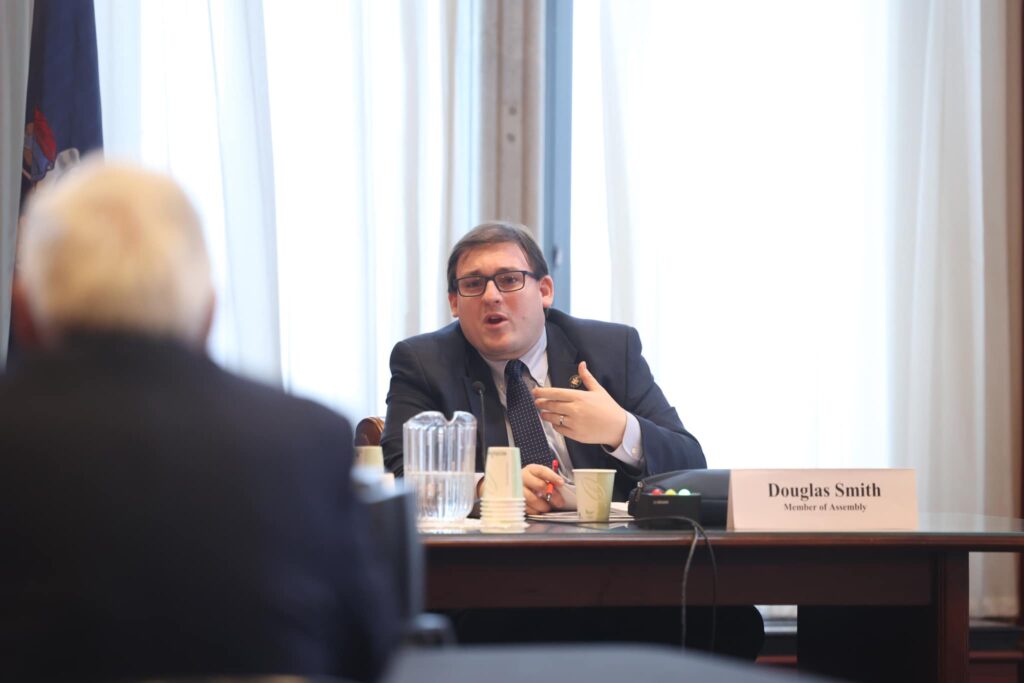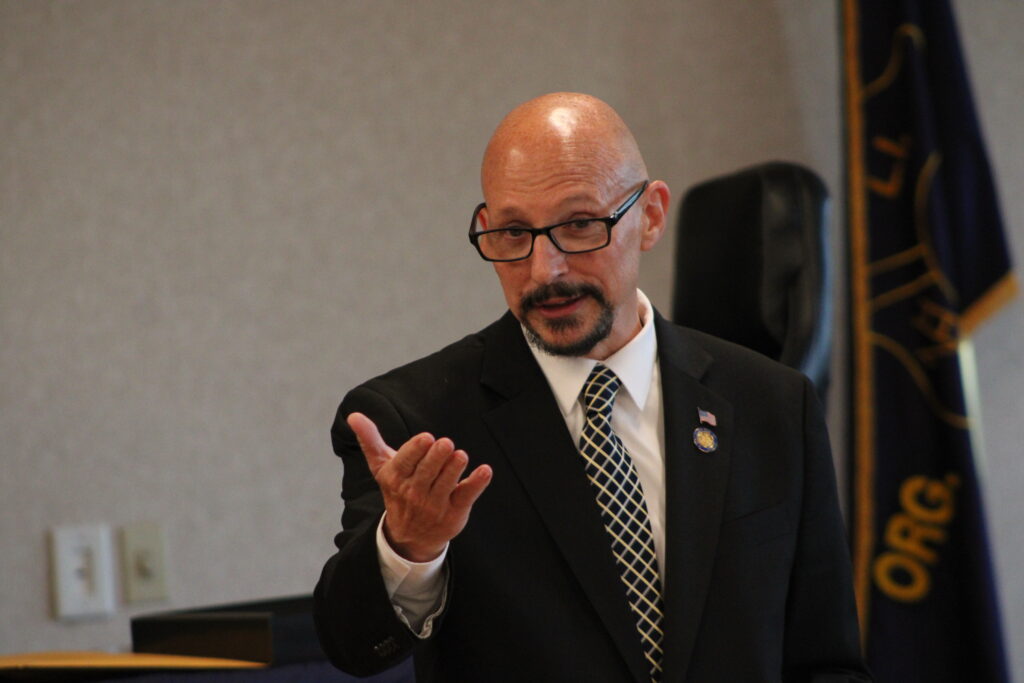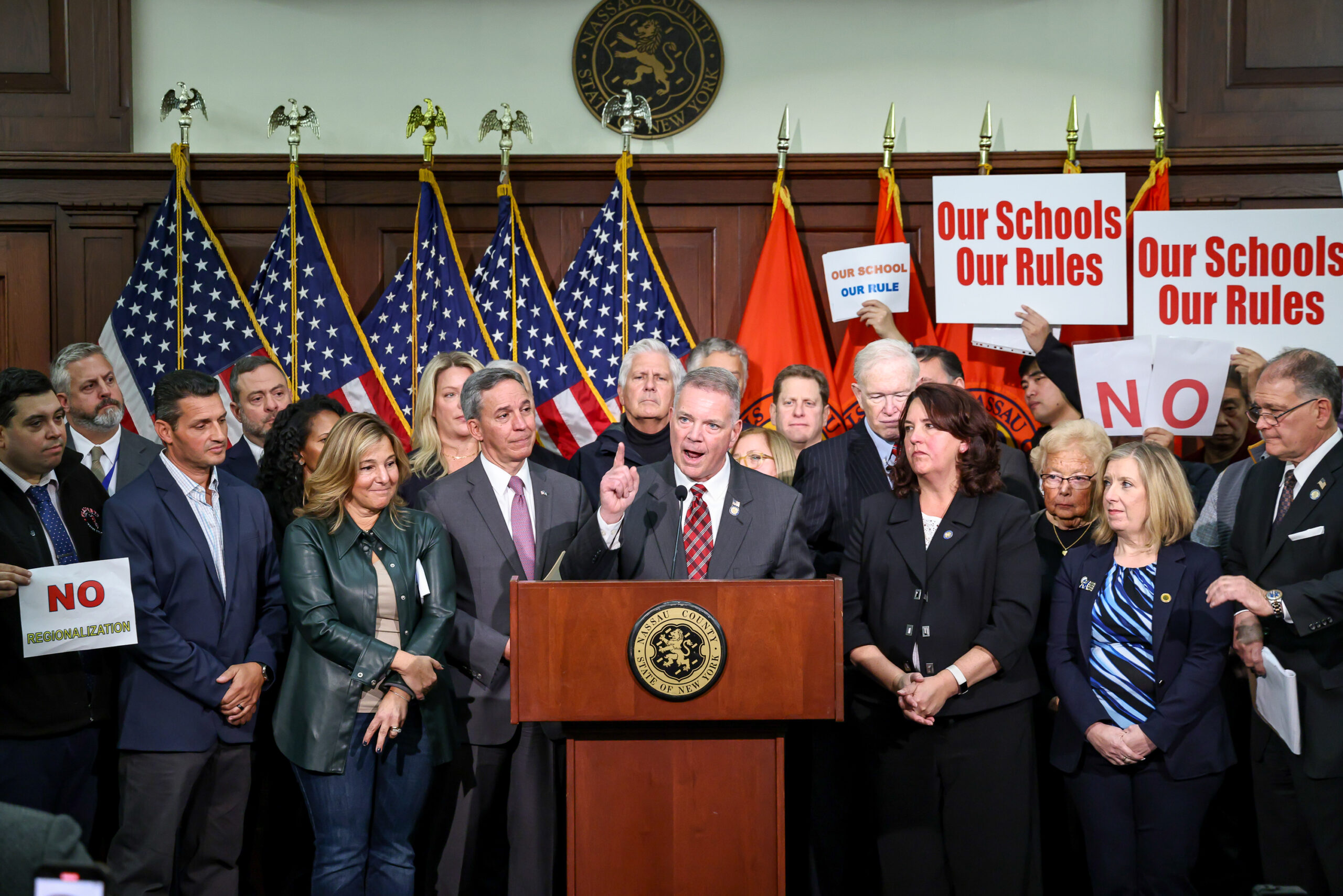Cover photo: Senator Rhoads protests the latest school regionalization plan from NYSED (Credit – NYS Senate Republican Conference)
In the wake of the contentious budgeting process last year that almost saw school districts across Long Island and the State lose hundreds of millions of dollars in State aid, known as Foundation Aid, another debate over education is forming.
Last year, Governor Kathy Hochul (D) proposed cutting hundreds of millions in Foundation Aid funding to school districts and amending the “hold harmless” formula, which was originally instituted to ensure no school districts start each year with less State funding than they received last year. The plan was widely panned by both sides of the aisle, but the State government is still grappling with how to save funds from school districts with declining enrollment, while also not forcing districts to hike property taxes or pierce their tax caps, while also delivering services and retaining jobs.
The regionalization plan, as it currently stands, would allow for districts to opt-in to consolidating their resources, staff, or even their entire districts, as they see fit. The purpose of the plan is to help alleviate expenses in school districts while not cutting services. A commonly cited example is one of a rural Upstate school district who might not have the funds or personnel to staff Advanced Placement (AP) courses of certain areas of study, but a school nearby that does have those resources could effectively “share” with the aforementioned district.
At its current form, the legislation is not requiring school districts to opt into the program, but it did originally mandate all school districts to convene with State leadership to understand aspects of the plan, should they choose to opt in after the plan is set to take off in 2026.
However, a Tuesday statement from New York State Education Commissioner Betty Rosa has emphasized the optional nature of the plan, and the State has even removed the mandate that school districts attend the previously voluntary meeting on the plan.
“To address concerns about mandatory participation, a new provision (Section 124-2.8) will be added, which allows districts in consultation with their school boards to not elect to participate in the regionalization planning process by submitting written notification by January 15, 2025.”
The letter adds that suggested amendments to regionalization plans will remain “advisory rather than mandatory,” the letter continues. “This ensures that districts maintain full control over the plans they develop.”

Some elected officials have already addressed the letter on social media, with Senator Mario Mattera (R-St. James) (pictured above) calling Rosa’s letter evidence of “strength in numbers” and the work of a fierce Republican minority that evoked the amendment. However, Mattera warns that “we must and will remain vigilant,” as the lawmakers are most concerned with the preservation of local control and home rule.
Assemblyman Doug Smith (R-Holbrook) (pictured below), Ranking Member of the Education Committee, and a former math teacher, released a statement last week shortly after the announcement of the regionalization plan.

“It is clear that any ‘Regionalization’ efforts proposed by the New York State Department of Education (NYSED) must remain entirely optional,” said Smith in his statement. “I have spoken directly with representatives of NYSED, who have assured me that their initiative is centered on gathering feedback from school districts and facilitating regional conversations. Importantly, they emphasize that any final decisions regarding participation in regionalization pans will rest solely with local school districts.”
Smith adds that “any initiative that seeks to reshape the structure or operations of our schools must ensure transparency, accountability, and most important, the consent of the communities it affects.” He is in constant discussions with NYSED as the plans are deliberated.
Interestingly, NYSED is the only State department that is not run by the Executive branch. NYSED is part of the SUNY system, which is run by the Board of Regents. NYSED’s executive is Commissioner Rosa. The Board of Regents’ seventeen members who serve five-year terms are elected by the state legislature, with thirteen members representing New York’s thirteen judicial districts, with four serving at large. The Education Commissioner is then appointed by the Board of Regents.
NYSED is responsible for overseeing public schools, administering standardized testing, producing and administering State tests and Regents exams, overseeing museums, libraries, and vocational rehabilitation, as well as higher education.
Several Long Island Senators met at the Nassau County Executive Building in Mineola, along with Nassau County Executive Bruce Blakeman (R-Atlantic Beach), to protest the proposed changes, as they are mainly concerned with at-large regionalization that would obscure district lines and complicate the synergy between school districts’ services and property taxes.

“Once again, it appears that Albany is looking for ways to circumvent local control… this time in our local school districts,” said Senator Dean Murray (R-East Patchogue) (pictured above). “This regionalization mandate that is being rammed through will basically allow the State Education Department to make decisions that will not only ignore our duly elected school boards but will also make decisions that will directly impact our children’s educational opportunities and our taxpayers’ pocketbooks.”
“NYSED’s overreach into mandating regionalization plans undermines the foundation of local control that has been central to New York’s education system for generations. This radical plan has the potential to force taxpayers to support schools outside of their districts, stripping communities of their autonomy and disregarding their voices,” said Senator Mattera. “I will continue to fight against this sweeping redistribution of resources to ensure that taxpayer dollars are spent where they belong—on the students and schools in their own districts.”
“This is the Bail Reform of education, bad policy being forced onto our communities with vague, unclear mandates. Local control has never failed us, and we intend to maintain our fight against this,” said Senator Alexis Weik (R-Sayville).
“Any changes to the State’s educational system must protect local control, allow schools to opt in or out, and ensure a fair distribution of education aid to address the many challenges facing school districts on Long Island and throughout New York,” said Senator Anthony Palumbo (R-New Suffolk). “The Albany centric, top-down approach, has been a failure on a number of issues, including Common Core, and I believe students, teachers and districts would be better served by fewer, and not more directives from state bureaucrats.”
“Once again, Albany is proposing to push top-down mandates that erode control local residents have over their schools and communities,” said Senator Patricia Canzoneri-Fitzpatrick (R-Malverne). “Locally elected boards of education are chosen by their communities to make decisions that meet the educational needs of their students, and I will continue to oppose any efforts that would shift decision-making authority further away from the local communities.”
“Long Islanders pay some of the highest school taxes in the State and their local and State elected officials should and must have a voice in how those dollars are spent and where. That voice is being jeopardized by NYSED’s rushed, top-down Regionalization Plan,” said Senator Steven Rhoads (R-Bellmore).
“Long Island schools are regularly ranked among the very best in New York State. That fact is due in large part to our local control and educational structure, which prioritizes our students’ success. Schools are the backbone of Long Island and define our economic, social and cultural structures,” said Senator Jack Martins (R-Mineola). “They drive property values, economic growth, and influence civic engagement and even public services. We join our local communities in opposing any effort to force regionalization and fight to preserve local control.”
Senator Martin, along with Assemblyman Jake Blumencranz (R-Oyster Bay) are pitching their own plan, the Our Schools, Our Rules Act. The bill would prohibit the development or implementation of State-mandated regionalization plans and prevent districts from being forced to share resources, administrative operations, or instructional services under any State law.
The bill would also nullify any existing laws on the books mandating regionalization and would allow districts to voluntarily collaborate with others, the Boards of Cooperative Educational Services (BOCES), charter, and/or private schools without State directives.
Finally, it would guarantee that school boards retain their local control and decision-making authority over governance and budgeting.
This is a developing story.




